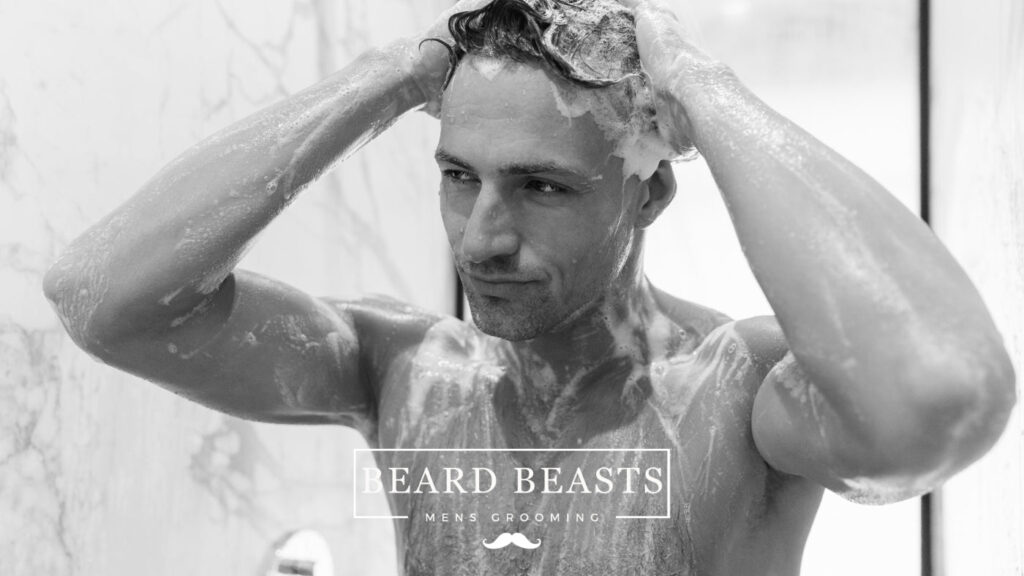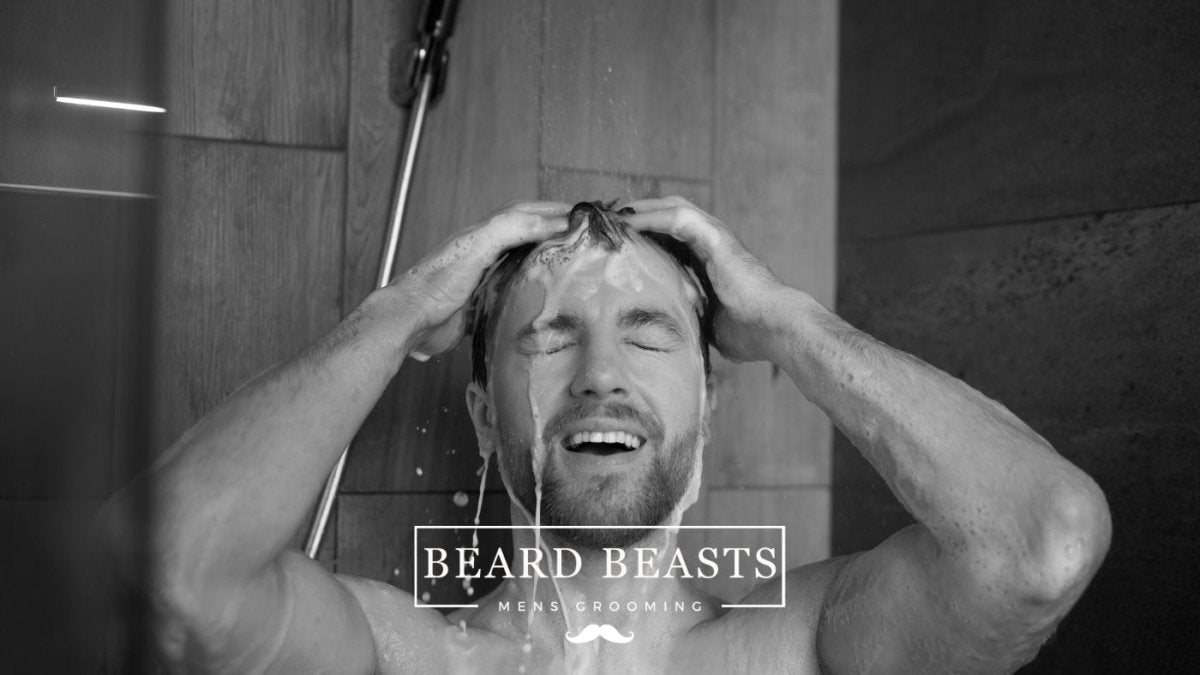When it comes to personal grooming, one question that often surfaces is, How often should men wash their hair? It’s a simple query, but the answer is anything but straightforward. With a plethora of advice available, ranging from daily washes to more sporadic schedules, it can be challenging to determine what’s best for your hair’s health and appearance. This article aims to shed light on the optimal frequency for shampooing men’s hair, taking into account various factors such as hair type, lifestyle, and environmental conditions.
Understanding the nuances of your hair and scalp, and how they interact with products and daily activities, is crucial for maintaining healthy, great-looking hair. Whether you’re wondering how often guys should wash their hair or how to choose the right shampoo, this guide is designed to provide clear, valuable insights.
By breaking down the science of hair care and debunking common myths, we’ll help you navigate the dos and don’ts of hair washing, ensuring you can make informed decisions about your grooming routine. Let’s dive into the essentials of men’s hair care and find out how often a man should shampoo his hair for the best results.
Understanding Your Hair Type
Before diving into the specifics of how often should men wash their hair, it’s crucial to identify your hair type. Generally, hair falls into a few categories: oily, dry, normal, curly, and thin.
Oily hair tends to look greasy quickly due to excess sebum production.
Dry hair often feels rough and looks dull, signaling a lack of natural oils.
Normal hair strikes a balance, not too oily or dry, and is relatively easy to manage.
Curly hair can range from loose waves to tight spirals and often struggles with moisture retention.
Thin hair lacks volume and can become oily faster due to closer contact with the scalp.
Understanding your hair type is the first step in optimizing your hair care routine, especially when deciding how often to wash your hair. Each type has unique needs that influence the ideal washing frequency.

How Often Should Men Wash Their Hair
Oily Hair: If you have oily hair, you might find yourself asking, “How often should guys wash their hair?” The answer varies, but oily hair may require more frequent washing, perhaps every other day, to manage excess oil and maintain a clean appearance.
Dry Hair: Those with dry hair should limit their washing to prevent further stripping of natural oils, often reducing it to once or twice a week. Over-washing can exacerbate dryness, leading to breakage and dullness.
Normal Hair: If you’re blessed with normal hair, washing every two to three days works well. This schedule keeps your hair clean without over-drying or increasing oil production.
Curly Hair: Curly hair benefits from less frequent washing to preserve natural oils that help maintain moisture and elasticity. Once a week is often sufficient, depending on the curl type and level of dryness.
Thin Hair: For men with thin hair, the main concern is preventing oil buildup without causing additional hair loss. Washing every other day with a gentle shampoo can strike the right balance.
Knowing how often should a man shampoo his hair is more than just a matter of personal preference—it’s about understanding and responding to your hair’s specific needs.
By identifying your hair type and adjusting your washing frequency accordingly, you can maintain healthier, more vibrant hair that looks great day in and day out. Remember, there’s no one-size-fits-all answer, and experimenting with different schedules can help you find the perfect routine for your locks.
Factors Affecting Hair Washing Frequency
When determining how often should men wash their hair, scalp health plays a pivotal role. Conditions like dandruff and seborrheic dermatitis are more than just nuisances; they signal your scalp’s need for a tailored washing routine. Dandruff, for instance, can sometimes require more frequent shampooing with specialized products to control flaking and itching.
Conversely, seborrheic dermatitis, characterized by oily and irritated skin, might also benefit from specific care routines, including medicated shampoos. Understanding and addressing your scalp condition can guide you to the most suitable washing frequency, ensuring both scalp and hair remain healthy.
Lifestyle and Activities
Your daily activities significantly influence how often you should clean your hair. Regular exercise, outdoor activities, and the use of styling products can lead to sweat buildup, attract dirt, and increase oil production, necessitating more frequent washing.
If you’re active or use products to style your hair, you might find that washing your hair every other day or so helps maintain balance, preventing clogged pores on the scalp and ensuring your hair looks and feels fresh. However, it’s crucial to use gentle, suitable products to avoid stripping your hair of its natural oils.
Environmental Factors
External elements like weather and pollution can also dictate your hair washing needs. High humidity can cause your hair to become frizzier or greasier, potentially requiring more frequent washing or the use of specific styling products to manage the effects.
On the flip side, cold, dry weather might strip your hair of moisture, suggesting a reduced washing frequency to preserve natural oils. Pollution is another factor, as environmental contaminants can cling to your hair, leading to dullness and damage over time. In heavily polluted areas, washing your hair with a gentle, detoxifying shampoo every couple of days can help mitigate these effects.
Determining how often should men wash their hair isn’t a straightforward equation. It involves considering various personal and environmental factors, from scalp health and daily activities to the impact of weather and pollution. By paying attention to these aspects and adjusting your hair care routine accordingly, you can maintain optimal scalp health and hair appearance.
Remember, the goal is to find a balance that works for you, ensuring your hair remains clean, healthy, and vibrant without overwashing or underwashing. Experimentation and observation are key to discovering the perfect routine for your unique hair and lifestyle needs.
Hair Washing Techniques
Mastering the art of shampooing is essential for maintaining healthy hair and scalp. Here’s a step-by-step guide to ensure you’re getting the most out of your hair washing routine:
- Wet Your Hair Thoroughly: Start with lukewarm water to open the hair cuticles and prepare the scalp for cleaning.
- Apply Shampoo: Use an amount the size of a quarter (more for longer hair), spread it between your palms, and then apply evenly throughout your scalp.
- Massage Gently: Use your fingertips to massage the shampoo into your scalp with circular motions. This stimulates the scalp and helps lift away dirt and oil without causing damage.
- Rinse Well: Ensure all shampoo is thoroughly rinsed out with lukewarm water to prevent buildup that can lead to irritation.
- Repeat if Necessary: If your hair is particularly dirty or oily, a second, lighter shampooing might be needed.
Following these steps helps clean your scalp effectively, promoting healthy hair growth and preventing issues like dandruff and scalp irritation.
To Condition or Not to Condition
Conditioning is a crucial step in the hair care routine, but its use depends on your hair type and health:
- For Oily Hair: Use a lightweight conditioner only on the ends of your hair to avoid weighing it down.
- For Dry or Curly Hair: Hair conditioner is a must to add moisture and reduce frizz. Apply generously from mid-lengths to the ends, avoiding the scalp to prevent greasiness.
- For Normal Hair: A regular conditioner applied to the ends can help maintain its health and shine.
- For Thin Hair: Opt for volumizing conditioners that don’t leave residue, focusing on the ends to avoid limpness.
Conditioning helps detangle, soften, and protect your hair, making it more manageable and less prone to breakage. Regardless of your hair type, choose a conditioner that complements your shampoo and addresses your hair’s specific needs.
Remember, while conditioning is generally beneficial, overuse can lead to buildup, so adjust frequency according to how your hair responds.
By mastering these hair washing and conditioning techniques, you can ensure that your routine is as effective as possible. Whether figuring out how often should a man shampoo his hair or how to condition properly, the key is to listen to your hair and scalp’s needs, adjusting your approach as necessary to maintain optimal hair health.
Myths vs. Facts: Hair Washing Edition
Navigating the world of hair care can be confusing, especially with so many myths circulating about how often men should wash their hair. Let’s set the record straight with some scientific facts.
Myth 1: Washing Your Hair Daily is Essential for Keeping It Clean
Fact: While cleanliness is important, washing your hair daily isn’t necessary for everyone. Overwashing can strip the scalp of its natural oils, leading to dryness and irritation. The ideal frequency depends on your hair type, lifestyle, and scalp condition. For most men, washing every 2-3 days is sufficient.
Myth 2: The More Shampoo You Use, the Cleaner Your Hair
Fact: Using too much shampoo can actually be counterproductive, causing buildup and potentially irritating your scalp. A quarter-sized amount of shampoo is enough for most hair lengths. The key is to focus on massaging the scalp gently to remove dirt and oil effectively.
Myth 3: Cold Water Rinses Make Your Hair Shinier
Fact: While cold water can help to close the cuticle and make the hair appear shinier, it’s not a guaranteed method for all hair types. The overall health of your hair, including how you wash and treat it, plays a more significant role in its shine and appearance.
Myth 4: Conditioner Causes Hair to Fall Out
Fact: Conditioner is designed to moisturize and detangle hair, not cause it to fall out. Hair shedding is a natural process, and you may notice loose strands more when you’re applying conditioner simply because you’re paying closer attention. Unless you’re experiencing unusual hair loss, conditioner is not to blame.
Myth 5: If Your Hair is Greasy, You Should Wash It More
Fact: This isn’t always the case. Overwashing can lead to an overproduction of oil as your scalp tries to compensate for the loss of natural oils. If your hair is greasy, consider using a gentle shampoo and adjusting your washing frequency to find a balance that works for your scalp’s oil production.
Understanding these myths and facts can help guide you to a more effective hair care routine. Remember, how often should guys wash their hair varies from person to person. Pay attention to your hair and scalp’s response to your washing routine and adjust as needed to maintain healthy, great-looking hair.
The Consequences of Over-Washing and Under-Washing
Finding the right balance in your hair care routine is crucial. Both over-washing and under-washing your hair can lead to issues that affect your scalp health and hair appearance. Let’s explore the potential consequences of each to better understand how often should men wash their hair?
Over-Washing
Washing your hair too frequently can strip it of its natural oils, which are essential for maintaining scalp health and hair vitality. Here are some issues caused by over-washing:
- Dryness and Irritation: Without enough natural oil, your scalp can become dry and irritated, leading to discomfort and flakiness.
- Increased Oil Production: Ironically, washing your hair too much can lead to even oilier hair. Your scalp might overcompensate for the loss of oils by producing more, creating a cycle of greasiness.
- Color Fading: For men with colored hair, frequent washing can cause the color to fade quicker, leading to more frequent and potentially damaging coloring sessions.
- Damage and Breakage: Natural oils protect and condition your hair. Without them, your hair can become weaker, leading to increased breakage and split ends.
Under-Washing
While over-washing has its downsides, not washing your hair enough can also lead to problems:
- Buildup: Dirt, oil, and product buildup can clog the pores on your scalp, leading to irritation and potentially inhibiting hair growth.
- Dandruff: A buildup of oil and skin cells can create an environment for dandruff-causing fungi to thrive, leading to flakiness and an itchy scalp.
- Odor: Just like any other part of your body, your scalp can start to smell if not cleaned regularly, due to the accumulation of sweat, bacteria, and oils.
- Dull and Lifeless Hair: Without regular washing, your hair can look dull, lifeless, and greasy, impacting your overall appearance and confidence.
Finding Your Balance
The key to a healthy hair care routine is finding the right balance between over-washing and under-washing. How often should men wash their hair? The answer varies based on individual factors such as hair type, scalp condition, lifestyle, and environmental exposure.
Listen to your hair and scalp, and adjust your washing frequency accordingly to maintain healthy, vibrant hair. Remember, personal observation and flexibility in your routine are your best tools for achieving optimal hair health.
Expert Insights
When it comes to maintaining optimal hair health, advice from hair care professionals and dermatologists is invaluable. Here’s what the experts have to say about how often men should wash their hair, offering insights that can help guide your personal hair care routine.
Listen to Your Scalp
Experts emphasize the importance of listening to your scalp’s needs. If your scalp feels itchy, overly oily, or if you notice flakes, it might be time to wash your hair. Conversely, if your scalp feels tight or your hair looks dull and lifeless, you might be washing too frequently. Adjusting your washing frequency based on your scalp’s condition can lead to healthier hair and scalp.
Choose the Right Products
The selection of hair care products plays a crucial role in maintaining hair health. Dermatologists recommend using shampoos and conditioners formulated for your specific hair type and concerns. For example, those with oily hair might benefit from clarifying shampoos, while those with dry or sensitive scalps should look for hydrating or sulfate-free options.
Avoid Hot Water
Hot water can strip your hair of essential oils, leading to dryness and irritation. Professionals suggest washing your hair with lukewarm water to prevent damage and preserve natural oils. This simple change can make a significant difference in your hair’s health.
Be Gentle
Both hair care professionals and dermatologists advise being gentle with your hair. Avoid scrubbing your scalp harshly when shampooing and gently pat your hair dry with a towel instead of rubbing it vigorously. This reduces the risk of hair breakage and scalp irritation.
Regular Trims
Regular haircuts not only keep your hairstyle in shape but also promote healthier hair by removing split ends. Hair care experts recommend getting a trim every 6-8 weeks to maintain optimal hair health.
Maintaining healthy hair involves more than just deciding how often to shampoo; it’s about understanding and catering to the unique needs of your hair and scalp.
By following these expert insights and adopting a tailored approach to your hair care routine, you can ensure your hair remains healthy, strong, and vibrant. Remember, the best routine is the one that works for you, so don’t be afraid to adjust your habits as your hair’s needs evolve.
The Dos and Don’ts of Hair Washing for Men
Navigating the world of hair care can be tricky. Here’s a straightforward guide on the dos and don’ts of hair washing for men, designed to keep your hair looking its best.
Dos:
- Do Identify Your Hair Type: Understanding whether you have oily, dry, normal, curly, or thin hair can significantly influence how often you should wash your hair.
- Do Use the Right Products: Select shampoo and conditioner that match your hair type and scalp condition. This can make a big difference in your hair’s health and appearance.
- Do Wash with Lukewarm Water: Hot water can strip your hair of essential oils, so opt for lukewarm water to protect your hair and scalp.
- Do Massage Your Scalp: Gently massage your scalp with your fingertips when shampooing. This promotes blood circulation and helps effectively remove dirt and oil.
- Do Rinse Thoroughly: Ensure all shampoo and conditioner are thoroughly rinsed out to prevent buildup, which can lead to scalp issues.
Don’ts:
- Don’t Wash Too Frequently: Over-washing can strip your hair of its natural oils, leading to dryness and irritation. Adjust your washing frequency based on your hair type and lifestyle.
- Don’t Use Too Much Shampoo: A quarter-sized amount is usually sufficient. Using too much can lead to product buildup and waste.
- Don’t Scrub Too Hard: Be gentle with your hair to avoid causing damage or breakage. Harsh scrubbing can also irritate your scalp.
- Don’t Ignore Your Scalp: If you notice persistent issues like excessive dryness, oiliness, or flakiness, it might be time to consult a professional or switch your hair care products.
- Don’t Forget to Condition: Especially if you have dry or curly hair. Conditioner helps moisturize and protect your hair. Apply it mainly to the ends and mid-lengths to avoid greasy roots.
How often should men wash their hair isn’t a one-size-fits-all question. By following these dos and don’ts, you can find a hair washing routine that works best for you, ensuring your hair stays healthy, clean, and stylish. Remember, the key to great hair care is understanding and responding to your hair’s unique needs. Keep experimenting until you find the perfect balance for your hair type and lifestyle.
Concluding How Often Should Men Wash Their Hair
Navigating the waters of hair care can seem daunting, but understanding the basics of how often should men wash their hair can make a significant difference in your hair’s health and appearance. The key takeaway from our guide is that there’s no one-size-fits-all answer to “how often should men wash their hair?” Instead, the ideal frequency depends on a variety of factors, including your hair type, scalp condition, lifestyle, and environmental exposures.
Key Takeaways:
- Personalization is Key: Tailor your hair washing routine to fit your unique hair type and lifestyle needs. Whether you have oily, dry, curly, or thin hair, adjusting your washing frequency accordingly can help maintain your hair’s natural balance.
- Use Suitable Products: Choosing the right shampoo and conditioner for your hair type is crucial. Look for products that address your specific hair and scalp needs to ensure optimal health.
- Mind Your Scalp: Pay attention to your scalp’s health. Conditions like dandruff or seborrheic dermatitis may require special care or changes in your washing routine.
- Technique Matters: Adopt proper washing and conditioning techniques, including using lukewarm water, massaging the scalp gently, and thoroughly rinsing out products.
- Balance Washing Frequency: Over-washing can strip your hair of essential oils, while under-washing can lead to buildup and scalp issues. Find a balance that keeps your hair feeling clean and healthy without overdoing it.
In conclusion, how often should men wash their hair should be based on a careful consideration of their individual needs and circumstances. By following the guidelines and insights provided in this article, you can ensure that your hair care routine supports the health and appearance of your hair. Remember, the goal is to keep your hair and scalp in their best condition, so be willing to adjust your routine as your hair’s needs change over time. Here’s to healthier, happier hair!





